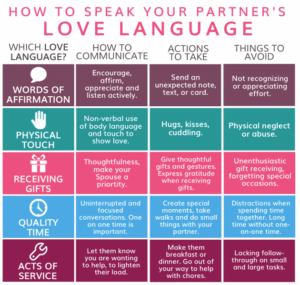My husband and I are on very different pages when it comes to how we share and receive love. Whether we are recovering from a fight, experiencing grief, or just want to show some love, we’ve learned over the years it takes a little understanding and growth to reach each other. For my husband, he desires words of affirmation and acts of service. He longs to connect emotionally through conversation and really appreciates when those words are backed up with action. For me, I crave quality time and physical touch, so I’m all about snuggling up on the couch together when I want to connect.
When we first started dating, we learned quickly that we received love differently. Which meant, we had to recalibrate how we showed love to each other. Ryan didn’t feel loved when I held his hand in silence, as I would enjoy. I had to develop the ability to speak tenderly to his heart and show him I meant it. He had to learn that talking it out didn’t make me feel cared for, so reaching out to hold me or carving out time to be with me went a long way.
 The expression of one’s love and how they receive it was made clearer when pastor Gary Chapman published the book, The Five Love Languages. In this groundbreaking resource, Chapman identified five languages of love; essentially, how people receive and share love. By understanding where you fall and where the people you love identify, you can connect more deeply in your relationships. Understanding how those you care about feel loved will empower you to show them love in the most meaningful way. Let’s explore each and as we do, identify the one or two languages you speak and those that the ones closest to you speak.
The expression of one’s love and how they receive it was made clearer when pastor Gary Chapman published the book, The Five Love Languages. In this groundbreaking resource, Chapman identified five languages of love; essentially, how people receive and share love. By understanding where you fall and where the people you love identify, you can connect more deeply in your relationships. Understanding how those you care about feel loved will empower you to show them love in the most meaningful way. Let’s explore each and as we do, identify the one or two languages you speak and those that the ones closest to you speak.
Acts of Service
This love language values action; it feels the love when served through helpful acts of kindness. Perhaps your spouse feels most loved when you run some much-needed errands, clean up after dinner, or help the kids with their homework so they can take a little time for self-care. For some, this love language is very much appreciated and shows immense love.
I will say this: I’ve never been an “acts of service” kind of gal until I became a mom. It’s still not a dominant language, like physical touch and quality time, but becoming a parent makes acts of service much more appreciated. For both my husband and myself. I would venture to say that as a parent, this love language becomes valuable for both the mother and the father. So, don’t forget to add a little of this love into your marriage if you have children.
Physical Touch
This language is all about the feels. It doesn’t require much extra time or thought, but rather takes intentionality. If the one you love values touch, it’s the little things that speak loudly. A simple kiss before leaving the house for work and one when you return. A touch on the shoulder as you walk across the room. Holding hands in the car. Each of these simple gestures will make some feel more loved than anything else in the world. If your spouse craves this, be mindful. Without regular touch, they may feel unloved and withdraw. If you identify touch as your language, don’t be afraid to initiate or communicate your need for it.
Receiving Gifts
For some, feeling loved comes in the form of a gift. Whether big or small, this gesture will speak volumes. It often doesn’t matter what it is or how much it costs, either. For the receiver, it’s the thought that counts. A gift shows your partner or loved one that you thought of them. That you intentionally carved out margin in your life to show them just how much love you have.
If this language is not natural for you, just remember it doesn’t matter so much what it is, but rather that you thought of even giving him or her something. If you value this love language, share that with your spouse. Let them know so they can speak to your heart the way it longs to be spoken to.
Words of Affirmation
People who speak this love language value communication. They adore words. They want to hear how they are valued and that they are understood. They may want to hear compliments and be told, “I love you!”
One thing to note about this love language is that it requires a bit more uncovering if your spouse values it because there are many dialects of this language. For my husband, it’s not necessarily the compliments that make him feel loved but rather open communication of feelings. It’s responding to his thoughts and feelings in a way that makes him feel understood and cared about. But for some, it’s the compliments they crave. If someone you love values words of affirmation, find the dialect they speak and learn to speak that way in return.
Quality Time
This love language isn’t necessarily about the amount of time spent together, but rather the quality of it. For example, I need time with my husband one-on-one. That may look like regular dates together, a weekend getaway (doesn’t matter where), or a walk in the evening. I feel loved when we get to just simply be together, the two of us, intentionally focusing on one another. If your spouse or child craves time with you, remember that it means quality time. Not sitting on the couch together watching tv but being together for a period of time that puts the focus on each other.
Now remember, just because you feel loved in one area does not mean those you love speak the same language. It’s important to identify what makes those closest to you feel most loved and be intentional about showing them your love for them in that way. If you continually try to speak to them in your language, chances are they will often feel unloved. And don’t forget to communicate your language in return so that your spouse or family knows how best to speak your love language.
–Brittany Rust is an author, speaker, podcast host, and founder of For the Mama Heart. She’s also a regular contributor for Crosswalk, YouVersion, Propel Women, Focus on the Family, and has contributed resources to Single Christianity Magazine, iBelieve, ForEveryMom, and many more.
 Metro Voice News Celebrating Faith, Family & Community
Metro Voice News Celebrating Faith, Family & Community 







